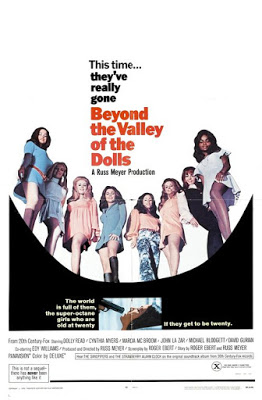Blindspot 2018: Cult Films of the 1950s to 1970s: Beyond the Valley of the Dolls
This month I watched a debut studio effort by sexploitation king Russ Meyer with Beyond the Valley of the Dolls. Kelly MacNamara (Dolly Read), Casey Anderson (Cynthia Myers), and Petronella “Pet” Danforth (Marcia McBroom) are members of an all-female rock band, who travel along with Kelly’s manager boyfriend Harris Allsworth (David Gurian) to Los Angeles to seek fame and fortune. There Kelly is reunited with her estranged aunt Susan Lake (Phyllis Davis), who connects the band to flamboyant record producer Ronnie “Z-Man” Barzell (John LaZar). The band soon find themselves tasting success, though they begin to succumb to the vices of sex and drugs.
Known for films such as 1965’s Faster, Pussycat! Kill! Kill! and 1968’s Vixen!, Russ Meyer was already a quite infamous sexploitation filmmaker when he was brought on board by 20th Century Fox to direct a film that was originally intended as a sequel to 1967’s Valley of the Dolls. However, with a script written by none other than film critic Roger Ebert, Beyond the Valley of the Dolls is very much its own film, satirizing the sex, drugs, and even violence prevalent within the music industry of the time.
One of the things quickly apparent within Beyond the Valley of the Dolls is the film’s jarring editing, which make use of many quick cuts that may or may not correspond to the previous shot, which is very much in tune with Soviet montage theory. Probably one of the more notable examples of this is the transition of a woman about to have an abortion screaming in the doctor’s office, which then cuts away to pancake batter being poured onto a pan. I have no idea how those two shots relate to each other, but it somehow works.
Filled with much gratuitous sex and drug use, Beyond the Valley of the Dolls was slapped with an X rating upon its release, even though the film is relatively tame by today’s standards. While there is a basic story to the film, there is not really much in terms of actual plot, with many of the character’s actions being quite laughable.
Probably the most jarring aspects of Beyond the Valley of the Dolls is how dark and violent the film gets in the third act, almost turning into a horror film. Even more jarring is how quickly the tone switches back for the film’s relatively happy ending.
It can probably be quite easy to label Beyond the Valley of the Dolls as softcore pornography, however there is much more to the film than meets the eye. Ultimately, the film is a commentary on the sex, drugs, and rock and roll style, with a catchy soundtrack performed by Lynn Carey and the band Strawberry Alarm Clock, who perform a number of their late-1960s hits at a party early in the film. Russ Meyer didn’t last too long in the studio system following this film, but Beyond the Valley of the Dolls remains one of the filmmaker’s best known films.
 LIKED IT
LIKED IT 
